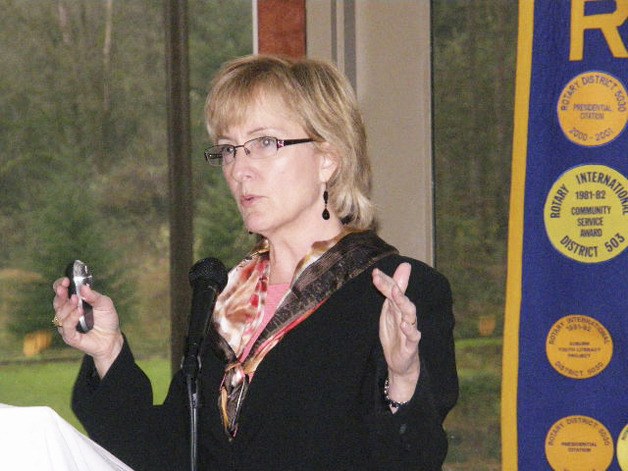Auburn community leaders expected to get a second transit parking garage out of the Sound Transit 2 (ST2) Plan voters passed in November of 2008, and they felt they had every right to expect it.
After all, said Auburn Mayor Pete Lewis, the Regional Transit Authority’s leaders promised to build a second parking garage more than 14 years ago when they agreed to enter a joint agreement with the City to build the first parking garage at the Sounder Transit Station. He heard, he said, the same promise in 1996 when the RTA became Sound Transit, and for years thereafter. And he says, Sound Transit dangled the second garage as a carrot before Auburn voters when it put its Sound Transit 2 (ST2) 15-year plan on the ballot in November of 2008.
The ST2 expansion plan asked to increase the sales tax from four-tenths of 1 percent up to ninth-tenths of 1 percent. It would also continue to use the motor vehicle excise tax. Fifty-seven percent of the voters approved.
What nobody anticipated, not even Sound Transit’s outside, independent budget forecaster for the plan, was that a recession would come along and take a 25-percent bite out of tax revenues needed to pay for ST2’s proposed raft of projects and improvements across Sound Transit’s three-county taxing district, Chief Executive Officer Joni Earl told members of the Auburn Rotary Club recently.
But the recession came, and suddenly the money was not there to do everything Sound Transit’s Board had hoped to do, Earl said. Because that was so, Sound Transit had to prioritize. And unfortunately for Auburn, the Sound Transit board has relegated the second garage to the red list of “no-money-in-the-plan-but-we’ll-study-it” projects for its South King County subarea.
Barring a quick easing of the recession and a return to boom times, that translates to “it would be unwise to hold one’s breath” waiting for that second garage west of the BNSF tracks in Auburn any time soon.
Earl said that its forecaster was very pessimistic about the long-term prospects, but missed the short term.
“Our forecaster had GDP going down on average 1-percent over the long haul. We got that information to the board, and they cut some stuff out of the plan right away to approve it. What our forecaster missed – and I don’t think it makes the board happy – was the near-term depth of the recession and its length. Although we still have MVET, we’re 90-percent dependent on the sales tax. Retail sales are down, all the governments that are dealing with sales tax have an issue along with us. For Sound Transit what that means is that our revenues over the 15-year plan from 2009 to 2023 are down 25 percent from the $17.8 billion we expected to collect, about $3.9 billion, Earl said.
“… As I said to the board when we were looking at all this,” Earl continued, “if I could come back to the board or the taxpayers and tell you I can do everything in the plan with 25-percent less revenue, you should fire me because that means we’re asking too much money from the taxpayers.”
Earl said that a key Sound Transit principle approved by voters in 2006 directs that revenue raised in a particular subarea be used to benefit that subarea. So while Sound Transit talks about a 25-percent revenue shortfall region wide, the South King subarea, which includes Auburn, is down 31 percent, an indicator of how tough the economy has been in this area.
In 2009 region wide, sales tax revenues were down 21 percent and Sound Transit turned to its project reserve fund to keep every ST2 project in. But the shortfall increased in 2010, and that fund is no longer available, so prioritizing of projects was necessary.
Lewis was not happy with the message.
“The first thing we heard about this was that we got a phone message that said our project had been removed from the list of projects that were to be funded,” Lewis said. “… For me, it’s really a simple thing — when they did ST2, they promised the second garage was going to be built. The citizen group that got this going has been there every step of the way to support Sound Transit. It’s time for that support to be repaid.”


